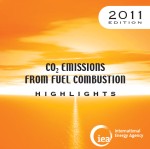The coal industry has certainly contributed to Australia’s wealth, but like heroin destroys addicts and those around them, our coal buzz is helping to destroy the environment that supports us and rehab will be a costly affair.
According to a 134 page report from the International Energy Agency (IEA) entitled “CO2 Emissions From Fuel Combustion” (PDF), Australia’s coal and peat related emissions grew from 73.2 million tonnes in 1970 to 220.9 million tonnes in 2009. For the period 1990 to 2009, the emissions belched by the burning of coal and peat (the latter a minor component in Australia) jumped 61%.
Australian coal/peat emissions (millions of tonnes):
1970 – 73.2
1975 – 90.3
1980 – 104.0
1985 – 116.7
1990 – 137.1
1995 – 152.4
2000 – 189.3
2005 – 222.1
2007 – 218.0
2008 – 219.0
2009 – 220.9
In addition to the emissions generated locally, Australia can also be considered a “Typhoid Mary” of sorts in that huge amounts of the coal we mine here is sent overseas. The total emissions generated from Australian coal burned elsewhere combined with local figures would be truly staggering.
As the world’s largest coal exporter, Australia supplies more than 20 countries around the world. According to the Australian Coal Association, our biggest markets in 2009-10 were Japan (39%), China (14%), South Korea (14%), India (11%), Taiwan (9%) and Europe (6%)
The IEA states two-thirds of global emissions for 2009 originated from just ten countries; with China and the United States combined producing 41% of the world’s carbon emissions. The IEA points a finger at electricity/heat generation and transport as being major culprits, producing nearly two-thirds of global carbon dioxide emissions in 2009, up from 58% in 1990.
While the 2008-2009 economic crisis held emissions somewhat at bay, a large rebound is anticipated in 2010 figures.
Echoing a call from the IEA earlier this month to end fossil fuel subsidies, IEA chief economist Faith Birol said in a recent interview with EurActiv the current $409 billion equivalent of fossil fuel subsidies are only encouraging a wasteful use of energy.
IEA’s World Energy Outlook 2011 report, which will be released on 9 November, says stopping fossil fuel subsidies would reduce CO2 emissions and help renewables such as solar energy and wind power to gain a bigger market share.
Related:
Energy Matters Coal Consumption And Carbon Emissions Counter







































